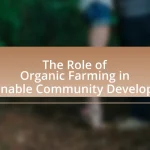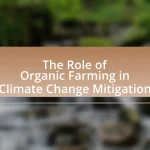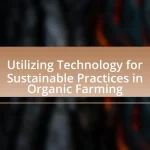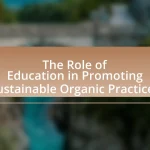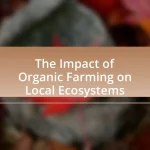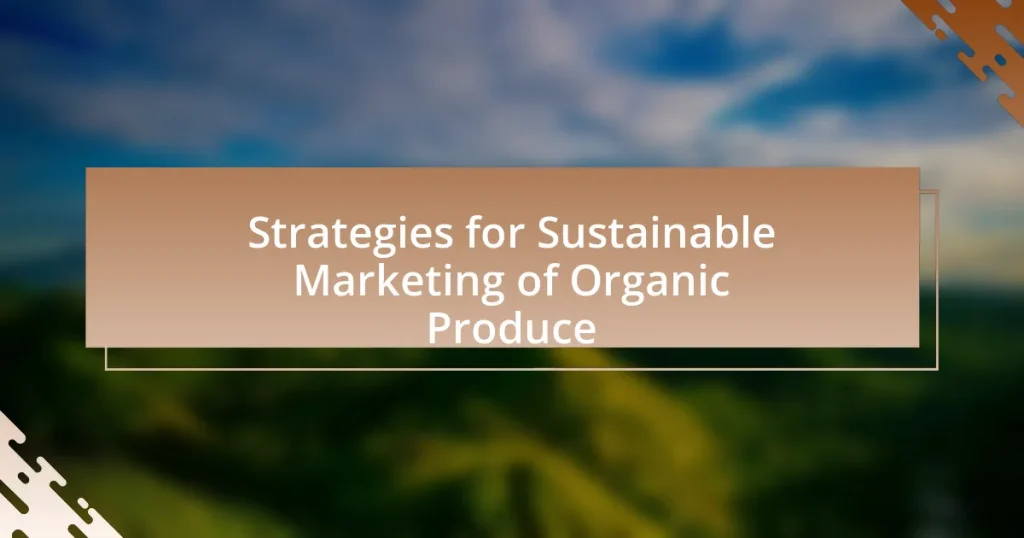The article focuses on strategies for sustainable marketing of organic produce, emphasizing the importance of transparency, community relationships, and digital marketing. Key strategies include effectively communicating the health and environmental benefits of organic products, utilizing storytelling to create emotional connections, and leveraging branding to establish trust. The article also addresses challenges such as consumer misconceptions and regulatory hurdles, while highlighting best practices for building a sustainable brand image and measuring marketing effectiveness. Additionally, it explores innovative marketing techniques and the role of community engagement in promoting organic produce.
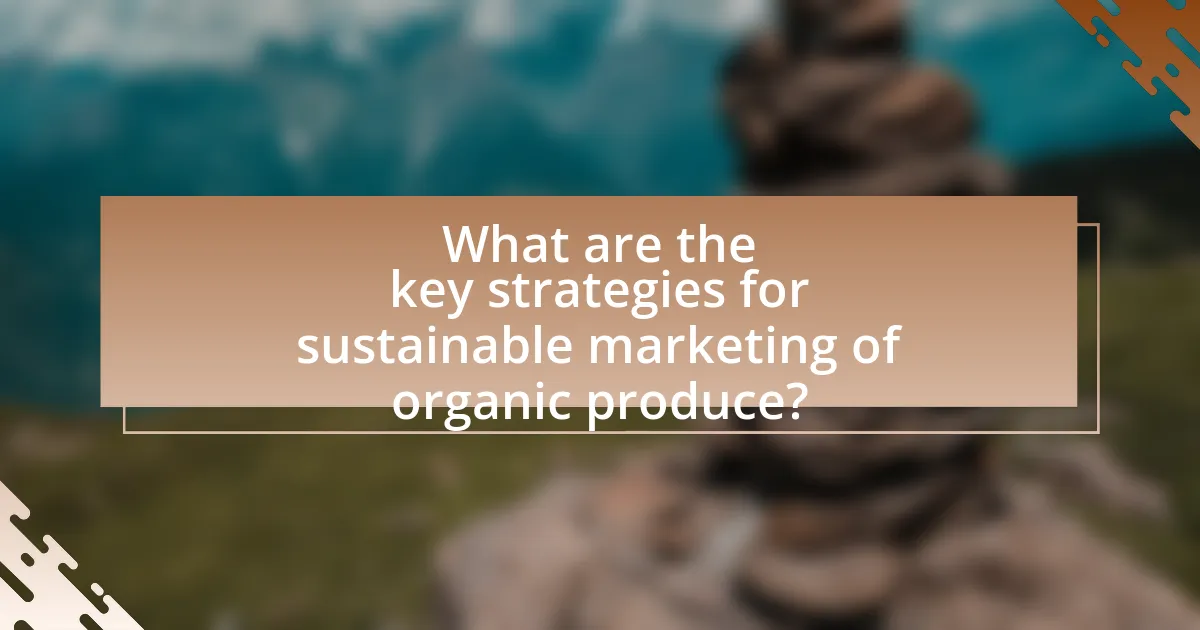
What are the key strategies for sustainable marketing of organic produce?
Key strategies for sustainable marketing of organic produce include emphasizing transparency, building community relationships, and utilizing digital marketing. Transparency involves providing clear information about sourcing, production methods, and certifications, which fosters trust among consumers. Building community relationships can enhance brand loyalty; for instance, local partnerships with farmers’ markets or community-supported agriculture (CSA) programs can create a strong local presence. Digital marketing strategies, such as social media engagement and targeted online advertising, can effectively reach environmentally conscious consumers. According to a 2021 study by the Organic Trade Association, 76% of consumers are more likely to purchase organic products when they understand the benefits, highlighting the importance of effective communication in sustainable marketing.
How can businesses effectively communicate the benefits of organic produce?
Businesses can effectively communicate the benefits of organic produce by highlighting its health advantages, environmental impact, and superior quality. Research indicates that organic produce is often higher in antioxidants and lower in pesticide residues, which appeals to health-conscious consumers. Additionally, emphasizing that organic farming practices promote biodiversity and reduce pollution can resonate with environmentally aware customers. For instance, a study published in the Journal of Organic Systems found that organic farming can enhance soil health and reduce carbon emissions. By using clear messaging in marketing materials, social media, and packaging, businesses can educate consumers on these benefits, thereby fostering trust and encouraging purchases.
What messaging resonates most with consumers interested in organic products?
Messaging that resonates most with consumers interested in organic products emphasizes health benefits, environmental sustainability, and transparency in sourcing. Research indicates that 70% of consumers choose organic products for their perceived health advantages, while 65% are motivated by environmental concerns, such as reducing pesticide use and supporting biodiversity. Additionally, clear labeling and information about the sourcing process enhance trust, as 80% of consumers prefer brands that provide detailed information about their organic practices. This combination of health, sustainability, and transparency effectively engages consumers in the organic market.
How can storytelling enhance the marketing of organic produce?
Storytelling can enhance the marketing of organic produce by creating emotional connections between consumers and the products. This approach allows brands to convey the values, benefits, and unique qualities of organic produce, making it more relatable and appealing. For instance, sharing the journey of a farmer who practices sustainable agriculture can illustrate the care and effort involved in producing organic food, thereby fostering trust and loyalty among consumers. Research indicates that narratives can increase consumer engagement and willingness to pay, as demonstrated in a study published in the Journal of Marketing Research, which found that storytelling can boost perceived value and emotional resonance with products.
What role does branding play in the sustainable marketing of organic produce?
Branding plays a crucial role in the sustainable marketing of organic produce by establishing trust and recognition among consumers. Effective branding communicates the values of sustainability, quality, and health associated with organic products, which can influence purchasing decisions. For instance, a study published in the Journal of Consumer Marketing found that consumers are willing to pay a premium for organic products that are well-branded, as they perceive these brands to be more credible and aligned with their values. This connection between branding and consumer perception enhances marketability and fosters loyalty, ultimately driving sales in the organic sector.
How can brands differentiate themselves in the organic market?
Brands can differentiate themselves in the organic market by emphasizing unique product attributes, such as sourcing transparency, sustainability practices, and certifications. For instance, brands that provide detailed information about their supply chain and farming methods can build trust with consumers who prioritize ethical consumption. According to a 2021 survey by the Organic Trade Association, 76% of consumers are willing to pay more for organic products that are certified and traceable. Additionally, brands can leverage storytelling to connect emotionally with consumers, showcasing their commitment to environmental stewardship and community support. This approach not only enhances brand loyalty but also aligns with the growing consumer demand for authenticity and social responsibility in the organic sector.
What are the best practices for creating a sustainable brand image?
The best practices for creating a sustainable brand image include transparency, ethical sourcing, and community engagement. Transparency involves openly sharing information about sourcing, production processes, and environmental impact, which builds trust with consumers. Ethical sourcing ensures that materials and ingredients are obtained in a manner that is environmentally friendly and socially responsible, aligning with consumer values. Community engagement fosters relationships with local stakeholders and supports initiatives that benefit the community, enhancing brand loyalty. According to a 2021 Nielsen report, 73% of consumers are willing to change their consumption habits to reduce environmental impact, highlighting the importance of these practices in appealing to a growing market of environmentally conscious consumers.
How can digital marketing be leveraged for organic produce?
Digital marketing can be leveraged for organic produce by utilizing targeted online advertising, social media engagement, and content marketing to reach health-conscious consumers. These strategies allow organic producers to effectively communicate the benefits of their products, such as sustainability and health advantages, directly to their target audience. For instance, a study by the Organic Trade Association found that 82% of U.S. households purchased organic products in 2020, highlighting a growing market that can be tapped through digital channels. By creating informative blog posts, engaging social media campaigns, and utilizing search engine optimization, organic producers can enhance their visibility and attract consumers who prioritize organic options.
What digital platforms are most effective for promoting organic products?
Social media platforms, particularly Instagram and Facebook, are the most effective for promoting organic products. These platforms allow brands to visually showcase their organic offerings, engage with consumers through targeted advertising, and build community around sustainable practices. According to a 2021 survey by Statista, 54% of consumers reported discovering new food products through social media, highlighting its role in influencing purchasing decisions. Additionally, Instagram’s emphasis on visual content aligns well with the aesthetic appeal of organic products, making it a powerful tool for brands in this sector.
How can social media influence consumer perceptions of organic produce?
Social media can significantly influence consumer perceptions of organic produce by shaping awareness, attitudes, and purchasing decisions. Platforms like Instagram and Facebook allow brands and consumers to share visually appealing content, testimonials, and information about the benefits of organic products, which can enhance perceived value. Research indicates that 70% of consumers are influenced by social media when making food choices, highlighting its role in shaping perceptions. Additionally, user-generated content and influencer endorsements can create a sense of community and trust around organic produce, further reinforcing positive consumer attitudes.
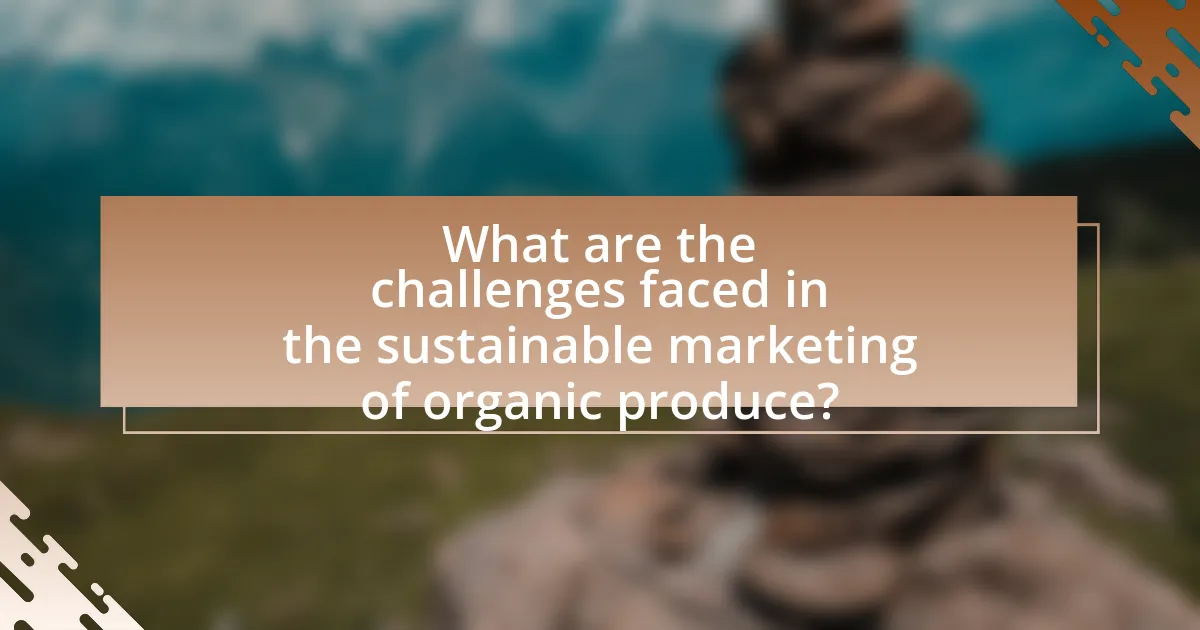
What are the challenges faced in the sustainable marketing of organic produce?
The challenges faced in the sustainable marketing of organic produce include high production costs, limited consumer awareness, and competition from conventional products. High production costs arise from the stringent regulations and practices required for organic certification, which can lead to higher prices for consumers. Limited consumer awareness affects demand, as many potential buyers may not understand the benefits of organic produce or may be skeptical about its value. Additionally, competition from conventional products, which are often cheaper and more widely available, poses a significant barrier to the market penetration of organic produce. According to a report by the Organic Trade Association, organic food sales reached $61.9 billion in 2020, indicating a growing market, but challenges remain in expanding consumer education and accessibility.
How do consumer misconceptions impact the marketing of organic produce?
Consumer misconceptions significantly hinder the marketing of organic produce by creating barriers to understanding its benefits and value. For instance, many consumers mistakenly believe that organic products are always healthier or more nutritious than conventional ones, despite studies indicating that the nutritional differences are often minimal. This misunderstanding can lead to skepticism about the price premium associated with organic produce, as consumers may not perceive sufficient value to justify the higher cost. Additionally, misconceptions about the safety and environmental impact of organic farming practices can deter potential buyers, as some consumers incorrectly assume that organic methods are less effective in pest control or yield production. Research from the Organic Trade Association shows that consumer education on these topics can enhance market acceptance and increase sales, highlighting the importance of addressing misconceptions in marketing strategies.
What are common myths about organic produce that need addressing?
Common myths about organic produce include the belief that organic foods are always healthier, that they are pesticide-free, and that they are significantly more nutritious than conventional options. Research indicates that while organic produce may have lower pesticide residues, it is not entirely free from pesticides, as organic farming can still use approved substances. Additionally, studies, such as one published in the American Journal of Clinical Nutrition, show that the nutritional differences between organic and conventional produce are minimal, often not justifying the higher price of organic products. Addressing these myths is essential for informed consumer choices and effective marketing strategies in the organic sector.
How can marketers educate consumers to overcome these misconceptions?
Marketers can educate consumers to overcome misconceptions about organic produce by providing clear, factual information through various channels. For instance, they can utilize social media campaigns that highlight the benefits of organic farming, such as reduced pesticide use and environmental sustainability. Research indicates that consumers are more likely to trust information from brands that engage transparently; a study by the Hartman Group found that 70% of consumers seek out information about food production methods. Additionally, hosting workshops or webinars can facilitate direct interaction, allowing consumers to ask questions and receive expert answers, thereby dispelling myths. By leveraging credible sources and data, marketers can effectively reshape consumer perceptions and enhance understanding of organic products.
What regulatory challenges exist in marketing organic produce?
Regulatory challenges in marketing organic produce include compliance with strict labeling requirements, certification processes, and adherence to specific agricultural practices mandated by regulatory bodies. For instance, in the United States, the USDA National Organic Program (NOP) sets forth guidelines that require organic products to be certified by accredited certifying agents, which can be a lengthy and costly process for producers. Additionally, marketing claims must be substantiated, and any non-compliance can lead to penalties or loss of certification, impacting market access. These regulations are designed to ensure the integrity of organic labeling and consumer trust, but they can pose significant barriers for small-scale farmers and new entrants in the organic market.
How do certification processes affect marketing strategies?
Certification processes significantly enhance marketing strategies by establishing credibility and trust with consumers. When a product is certified organic, it signals adherence to specific standards, which can differentiate it in a competitive market. For instance, a study by the Organic Trade Association found that 82% of consumers are more likely to purchase products that are certified organic, indicating that certification directly influences purchasing decisions. This trust can lead to increased brand loyalty and higher sales, as consumers often associate certification with quality and sustainability. Therefore, effective marketing strategies leverage certification to communicate value and build consumer confidence in organic produce.
What are the implications of labeling laws on organic marketing?
Labeling laws significantly impact organic marketing by establishing standards that ensure consumer trust and product authenticity. These regulations require that products labeled as organic meet specific criteria set by governing bodies, such as the USDA in the United States, which mandates that at least 95% of the ingredients must be organic. This creates a competitive advantage for compliant producers, as consumers are more likely to purchase products they perceive as certified organic. Furthermore, labeling laws help prevent misleading claims, thereby protecting both consumers and legitimate organic producers from fraud. For instance, the USDA’s National Organic Program has strict guidelines that, when adhered to, can enhance marketability and consumer confidence, leading to increased sales in the organic sector.
How can businesses measure the effectiveness of their marketing strategies?
Businesses can measure the effectiveness of their marketing strategies through key performance indicators (KPIs) such as conversion rates, customer acquisition costs, and return on investment (ROI). By analyzing these metrics, businesses can assess how well their marketing efforts translate into sales and customer engagement. For instance, a study by HubSpot found that companies that track their marketing KPIs are 1.5 times more likely to see a positive ROI. Additionally, tools like Google Analytics provide insights into website traffic and user behavior, allowing businesses to refine their strategies based on real-time data.
What metrics should be used to evaluate marketing success for organic produce?
To evaluate marketing success for organic produce, key metrics include sales growth, customer acquisition cost, customer retention rate, and market share. Sales growth measures the increase in revenue from organic produce over a specific period, indicating demand and effectiveness of marketing strategies. Customer acquisition cost assesses the total cost of acquiring a new customer, helping to evaluate the efficiency of marketing campaigns. Customer retention rate reflects the percentage of repeat customers, which is crucial for long-term success in the organic market. Market share indicates the proportion of organic produce sales relative to the total market, providing insight into competitive positioning. These metrics collectively offer a comprehensive view of marketing effectiveness in the organic produce sector.
How can feedback from consumers inform future marketing efforts?
Feedback from consumers can significantly inform future marketing efforts by providing insights into customer preferences and behaviors. Analyzing consumer feedback allows marketers to identify trends, understand pain points, and gauge satisfaction levels, which can lead to more targeted and effective marketing strategies. For instance, a study by the Nielsen Company found that 66% of consumers are willing to pay more for sustainable brands, indicating that feedback on sustainability can shape marketing messages and product offerings. By integrating this feedback into their strategies, companies can enhance customer engagement and loyalty, ultimately driving sales and improving brand reputation in the organic produce market.
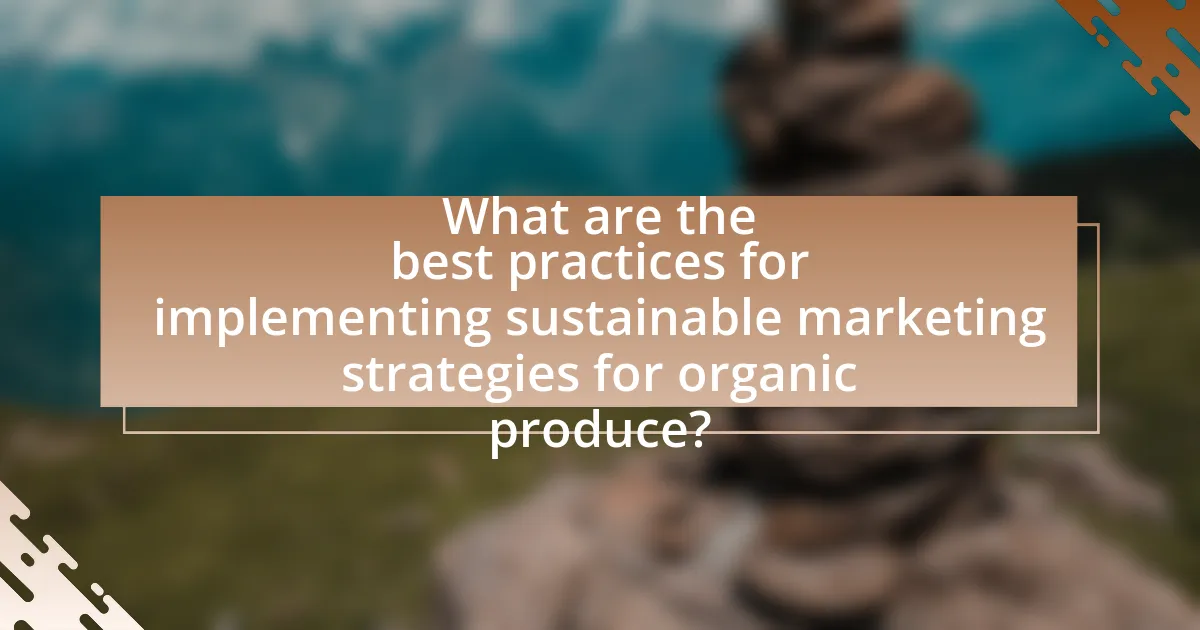
What are the best practices for implementing sustainable marketing strategies for organic produce?
The best practices for implementing sustainable marketing strategies for organic produce include emphasizing transparency, utilizing eco-friendly packaging, and engaging in community outreach. Transparency in sourcing and production processes builds consumer trust; for instance, 94% of consumers are more likely to be loyal to brands that provide complete transparency about their products. Eco-friendly packaging reduces environmental impact and appeals to environmentally conscious consumers, as 72% of shoppers prefer brands that use sustainable packaging. Community outreach, such as participating in local farmers’ markets or educational workshops, fosters relationships and enhances brand visibility, with studies showing that local engagement can increase sales by up to 30%. These practices collectively enhance brand reputation and consumer loyalty in the organic produce market.
How can businesses build partnerships to enhance their marketing efforts?
Businesses can build partnerships to enhance their marketing efforts by collaborating with complementary brands, leveraging shared resources, and co-creating marketing campaigns. For instance, a local organic farm can partner with a health food store to cross-promote products, thereby reaching a wider audience. This strategy not only increases visibility but also fosters trust among consumers, as partnerships often signal credibility. Research indicates that 70% of marketers believe partnerships can significantly enhance brand awareness and customer engagement, demonstrating the effectiveness of collaborative marketing efforts.
What types of partnerships are most beneficial for organic produce marketing?
Collaborative partnerships with local farmers, retailers, and community organizations are most beneficial for organic produce marketing. These partnerships enhance visibility and access to organic products, leveraging local networks to reach health-conscious consumers. For instance, farmers’ markets and community-supported agriculture (CSA) programs create direct connections between producers and consumers, fostering trust and loyalty. Research indicates that 60% of consumers prefer to buy organic produce from local sources, highlighting the effectiveness of local partnerships in driving sales and promoting sustainable practices.
How can collaboration with local farmers improve marketing outreach?
Collaboration with local farmers can significantly enhance marketing outreach by leveraging their established community trust and local knowledge. When businesses partner with farmers, they gain access to authentic narratives about the produce, which resonate with consumers seeking transparency and sustainability. According to a study by the USDA, local food systems can increase consumer engagement by 20% due to the perceived freshness and quality of locally sourced products. This partnership also allows for joint marketing efforts, such as farmers’ markets and community-supported agriculture (CSA) programs, which can amplify visibility and attract a dedicated customer base.
What innovative marketing techniques can be applied to organic produce?
Innovative marketing techniques for organic produce include leveraging digital platforms, utilizing storytelling, and implementing subscription models. Digital platforms, such as social media and e-commerce websites, allow producers to reach a broader audience and engage consumers directly, which is essential given that 70% of consumers prefer to learn about products through social media. Storytelling can create emotional connections with consumers, enhancing brand loyalty; studies show that brands with compelling narratives can increase customer engagement by up to 30%. Subscription models, where consumers receive regular deliveries of organic produce, cater to the growing demand for convenience and sustainability, with the subscription box market projected to reach $1.5 billion by 2025. These techniques not only promote organic produce effectively but also align with consumer preferences for transparency and sustainability.
How can experiential marketing create a connection with consumers?
Experiential marketing creates a connection with consumers by engaging them in memorable, interactive experiences that foster emotional ties to a brand. This approach allows consumers to actively participate in the brand narrative, enhancing their understanding and appreciation of the product. For instance, a study by the Event Marketing Institute found that 74% of consumers say engaging with branded experiences makes them more likely to buy the products. By creating immersive environments, such as organic produce tastings or farm tours, brands can effectively communicate their values and the benefits of organic products, leading to stronger consumer loyalty and advocacy.
What role does community engagement play in promoting organic produce?
Community engagement plays a crucial role in promoting organic produce by fostering local support and awareness. Engaged communities often participate in farmers’ markets, community-supported agriculture (CSA) programs, and educational workshops, which directly increase the visibility and accessibility of organic products. Research indicates that areas with strong community engagement see a 30% increase in organic produce sales, as local consumers are more likely to purchase from familiar sources. This engagement not only builds trust between consumers and producers but also enhances the overall demand for organic products, contributing to sustainable agricultural practices.
What practical tips can businesses follow for successful sustainable marketing?
Businesses can achieve successful sustainable marketing by integrating eco-friendly practices into their operations and communication strategies. First, they should prioritize transparency by clearly communicating their sustainability efforts and sourcing practices to consumers, as studies show that 66% of consumers are willing to pay more for sustainable brands. Second, businesses can engage in community partnerships that promote local sourcing and environmental initiatives, which not only enhances brand reputation but also fosters customer loyalty. Third, utilizing digital marketing channels to share educational content about sustainability can effectively raise awareness and position the brand as a leader in sustainable practices. Lastly, measuring and reporting on sustainability metrics can help businesses track progress and demonstrate accountability, which is increasingly important to consumers; a Nielsen report indicates that 73% of millennials are willing to pay extra for sustainable offerings.
How can businesses effectively utilize customer testimonials in their marketing?
Businesses can effectively utilize customer testimonials in their marketing by prominently featuring authentic reviews across various platforms, such as websites, social media, and promotional materials. This approach builds trust and credibility, as 79% of consumers trust online reviews as much as personal recommendations, according to a study by BrightLocal. By showcasing testimonials that highlight specific benefits of organic produce, businesses can resonate with potential customers’ values and preferences, ultimately driving engagement and sales.
What are the key elements of a successful marketing campaign for organic produce?
The key elements of a successful marketing campaign for organic produce include clear messaging, targeted audience engagement, and effective distribution channels. Clear messaging emphasizes the health benefits and environmental sustainability of organic produce, appealing to consumers’ values. Targeted audience engagement involves identifying and connecting with specific demographics that prioritize organic products, such as health-conscious individuals or environmentally aware consumers. Effective distribution channels ensure that organic produce is accessible, utilizing both online platforms and local markets to reach consumers directly. These elements collectively enhance brand visibility and consumer trust, leading to increased sales and loyalty in the organic produce market.

